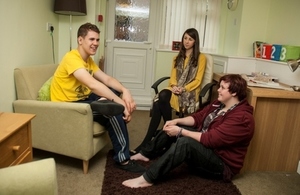First Social Care Report puts spotlight on leadership
Strong and stable leadership needed to bring about sustained improvement in help, care and protection of vulnerable young people.

Young people in a children's home
Figures published in Ofsted’s first stand-alone Social Care Annual Report show that of the 17 local authorities judged ‘inadequate’ in the past year, 11 had seen a new Director of Children’s Services recently installed while 12 had undergone another major change in senior leadership of one sort or another in the period prior to inspection.
Today’s report finds that in a climate of turbulence, increased workloads and intense scrutiny of children’s social care – much of it arising from public anxiety following a catalogue of high profile child deaths – many areas are struggling to improve their performance.
At the end of the first full three-year cycle of inspections, only four in 10 local authorities were judged to be ‘good’ or better for safeguarding children. And there are 20 local authorities (13% or one in seven) judged by Ofsted as ‘inadequate’ for their child protection arrangements at the time of their most recent inspection.
The report finds that the nationwide map of poor performance is complex and changing – with the group of authorities currently judged inadequate looking very different to that of July 2012.
However, inspectors have found that a persistent absence of stable leadership was a feature of most ‘inadequate’ local authorities. In these weakest places:
- the most basic acceptable practice was not in place
- supervision, management oversight, purposeful work with families and decisive action where children were at risk from harm were ineffective
- the views of children and families were rarely considered
- support from key statutory partners – health, police, schools – was weak and poorly co-ordinated; and
- in some inadequate authorities, managers did not appear to have a firm understanding of what constituted good practice – making the management of risk and support for staff at the frontline almost impossible
Today’s report does find that some authorities have worked hard to ensure their services are more effective and better able to meet the needs of children and families in their areas. In these areas, leaders and managers had a clear understanding of what was going on at the front-line and had coherent and urgent plans in place to address identified areas of need.
And while successive reviews of individual failures have emphasised the need for system change, the report argues that social care only succeeds when it sees and hears children, understands the impact of abuse and neglect and listens to them when they call for help, no matter how difficult to interpret that call may be.
Ofsted is re-shaping its social care inspections and judging services on the difference professional practice is making to the child, young person or family. Inspectors will evaluate the performance of local authorities end to end: from first contact to leaving care and everything in between.
Launching today’s report, HM Chief Inspector, Sir Michael Wilshaw, said:
As it stands today there are 20 councils where the standard of child protection is unacceptably poor and judged to be inadequate.
Incompetent and ineffective leadership must be addressed quickly. But where those in leadership positions have capacity and potential, this must be recognised and nurtured.
Too much leadership volatility in social care is counter-productive – that goes without saying. One in three local authorities has had a change in their Director of Children’s Services last year alone. The combination of unstable communities and political and managerial instability in our social care services is a dangerous mix.
Ofsted’s National Director for Social Care, Debbie Jones, said:
The picture of performance we are publishing today shows there is clearly an on-going need for improvement.
Some services are increasingly expert at reducing risk, helping families to look after their children and enabling children at risk in their area to make good progress.
It can be done, and therefore it must be done in all areas, equally well. Ofsted will be rigorous in holding local councils and social care providers to account but we will also support them to make the improvements that children deserve.
Today’s Social Care Annual Report is the first to be published separately from Ofsted’s state of the nation commentary on its other remits. It finds that the performance of England’s children’s homes and other regulated services such as adoption and fostering has generally improved over recent years – with a high proportion currently judged good or better on the basis of meeting minimum standards. However, Ofsted does not believe these standards are ambitious enough for children and forthcoming changes to inspection frameworks in these areas will focus on how services are supporting young people to succeed – resulting most likely in less generous judgements.
Alongside the Annual Report, Ofsted’s online tool, Data View, today includes findings from social care inspections for the first time. Data View allows comparison of inspection findings on the performance over time of providers at national, regional, local authority and constituency level.
Notes to editors
- The Social Care Annual Report is available on GOV.UK.
-
From Tuesday 15 October, social care inspection data is included on Ofsted’s web tool Data View.
- Today’s report is underpinned by the findings of more than 4,500 inspections carried out during 2012/13 of local authority children’s social care, children’s homes, independent fostering services and voluntary adoption agencies, adoption support agencies, Cafcass service areas, secure training centres and residential family centres, as well as residential special schools, boarding schools and FE colleges with residential provision – providing a unique evidence base for the key conclusions.
Media enquiries
Clive House
70 Petty France
London
SW1H 9EX
Email pressenquiries@ofsted.gov.uk
Monday to Friday, 8:30am to 6pm 0300 013 0415
Out of hours duty press officer 07919 057 359